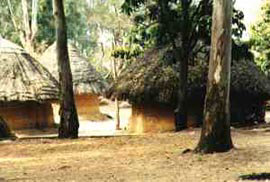 No room for despair No room for despair
The world oil price peaked at $40 per barrel in 1980, the price, ever since, has continued to average $20 a barrel. But that was even a good era, for nearly one year now, that price has been halved and it took the OPEC's intervention for the price to start showing any serious signs of recovery. Consequently, the nation's annual export earning has dropped to a paltry $3 billion compared with $25 billion in 1980. Aret Adams, immediate past Special Adviser on Petroleum to the country says the fall is significant for the economy.
At the domestic level, Nigerians have had to accept the contradiction that come with scarcity in the midst of plenty over the issue of petroleum products. It has become a reality that the sixth largest producer of oil, for over four years, has found it impossible to supply enough fuel for domestic use.
It is yet another burden the former Head of State bore with great pains. He had to pay huge amounts for the Turn Around Maintenance of the nation's four refineries whose combined production capacity of 445,000 barrel per day far exceeds the nation's total consumption which stands at a little over 300,000 barrels per day. Meanwhile, Obasanjo's headache in this regard will soon be over, the four refineries have taken off again, detonating the adverse effects of the independent marketers' threats to stop importation at the end of this month (June) unless the government grant them their request to raise price of petroleum products.
There is no doubt the Nigerian economy is oil-driven, since agricultural sector has suffered neglect which dragged its contribution to the nation's export earning to an all time low 0.78 per cent compared with the 76 per cent in 1960. Nigeria's minerals were also locked in the soil, unprocessed, denying the nation's the much needed foreign exchange.
Obasanjo however needs not be scared of the bad face of the economy. Nigeria is a land of hope. In fact, in Nigeria, people are coming to see hope and despair as a company. In a way, such attitude will help the new government too, or wouldn't it?
| Ruling a people who can wait on their leaders while they go through the luxury of trial and error measures as successive Nigerian leaders are wont to do, is a singular advantage. But much more than that, Nigeria needs a well focused fiscal and monetary policy plus good economy program that can turn its abundant natural endowment to wealth for the good of its people. This shouldn't be difficult for Obasanjo. In his first coming 25 years ago, he demonstrated good governance at least in the area of infrastructural development. After initial reluctance, the former military ruler picked the mantle of leadership after his predecessor, General Murtala Muhammed was cut down in a failed coup.

It was under him that the Kaduna and Warri refineries were built. Several Nigerian roads were also built. These include the Lagos inner ring road; the Lagos-Ibadan express road; the Jos, Bauchi, Warri, Benin major trunk road was started and the construction of Ikom-Ogoja-Katsina-Ala-Biu road was also carried out.
Airports were constructed in many state capitals, while the Tin Can Island seaport, the Kirikiri Lighter Terminal and Apapa petroleum tier were started to forestall the congestion that was setting into the existing ports.
General Obasanjo started a network of pipelines linking depots within a national grid structure. He initiated the tapping of the nation's gas potential with the signing of the LNG (Liquified Natural Gas) deal with Shell and BP . He carried out other sundry sweeping infrastructural developments that cut across power, telecommunications, education and agriculture. |

